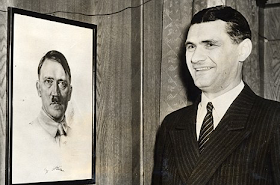Hans-Bernd August Gustav von Haeften (at his trial)
Born 18 December 1905
Lawyer
Diplomat
Werner Karl von Haeften
Born 9
October 1908
Claus
von Stauffenberg’s aide
The Haeften brothers were
nephews of Walther von Brauchitsch, the commander-in-chief of the German army
from 4 February 1938 to 10 December 1941.
Hans-Bernd was a lawyer and
worked for the Foreign Office. He was deeply religious, belonging to the
Confessing Church (established by Karl Barth, Martin Niemöller and Dietrich Bonhoeffer, amongst others), and
associated with the so-called Kreisau Circle – although he rarely attended, as
his senior position made this too risky.
Werner
was a lawyer who worked for a bank. He joined the army at the outbreak of war. From
late 1943, having been wounded twice, he served as adjutant to Claus von
Stauffenberg. He held the rank of First Lieutenant. A friend described him as
‘a kind of Siegfried with a sense of humour’.
In early
1944, Stauffenberg asked Werner to consider assassinating Hitler. Werner
thought he could shoot Hitler with a pistol.
However, Hans-Bernd refused
to have anything to do with killing Hitler. He persuaded his brother not to
shoot Hitler as this would break the commandment ‘Thou shalt not kill’ (the
fifth commandment in the Lutheran division of the Decalogue). Thereafter, Werner
remained troubled as to the morality of assassinating Hitler.
The effect of this dissuasion
persisted. It is probably the reason that Werner took no part in the
complicated process of arming the bomb on 20 July 1944.
However, Hans-Bernd did
support overthrowing Hitler, and was ready on the day of the coup to help
deliver control of the Foreign Office to the resistance.
Prior to 20 July 1944 Claus
von Stauffenberg took the bomb to Hitler on (at least) two
occasions (11 and
15 July), but was prevented from using it. On those days Werner was ill, and
Claus took another young officer of the conspiracy with him – Captain Friedrich Klausing.
On 20
July 1944, Werner accompanied Claus to the Wolf’s Lair. At various times that
day he carried the plastic explosive.
Werner
did not help arm the bomb – which was left to Claus despite the difficulties
due to his injuries. As noted, it was probably Werner’s scruples about the assassination
which prevented his involvement. The result was that Claus was able to arm only
half the explosive before he was interrupted by one of the worst-timed phone calls in history.
After placing the briefcase, Claus joined Werner and two others to watch the explosion. Satisfied that Hitler must be dead, Werner travelled with Claus in their car to the airfield. On the
way he threw from the car a parcel containing the unused plastic explosive – an
action observed by the driver. When the driver reported what he had seen, the
unused explosive was recovered, pointing to the involvement of the two officers
in the bombing.
Throughout
the afternoon and evening of 20 July, Werner remained with Claus at the Bendlerblock (Home Army headquarters) in Berlin.
Hans-Bernd waited with Adam von Trott and others in the Foreign Office. They expected an armed escort to
Broadcasting House, where they would make broadcasts on behalf of the new
regime. When they saw the roadblocks being removed as the plot unravelled, a
friend described it as a ‘ghastly moment’ and said Hans-Bernd went ‘white as a
sheet’.
In the early hours of 21 July
1944, General Fromm summarily sentenced Claus von Stauffenberg, along with Werner, as well as
General Olbricht and Colonel Mertz, to death by firing squad – a sentence
carried out forthwith.
Werner died when he threw
himself in front of the volley meant for Claus.
With his brother Werner so
deeply involved in the July plot, Hans-Bernd was an early suspect.
On 23 July 1944, he was
arrested.
On 15 August 1944, he was
brought before the Nazi 'People’s Court'. During his trial he described Hitler as ‘the
incarnation of evil in history’.
He was hanged that day in Plötzensee
prison.
This is an edited extract
from TREASON: Claus von Stauffenberg and the Plot to Kill Hitler




.jpg)